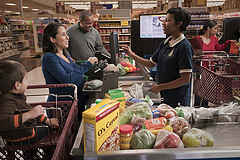Eat Well and Spend Less by Using the Three R’s
 By the “three R’s,” we’re not referring to readin’, ‘ritin’ and ‘rithmetic … although those school subjects are definitely useful tools for keeping track of your food consumption. Rather, the basics of green living – reduce, reuse, recycle – can help you spend less on groceries while still eating healthfully and well. Here's how to apply these principles to real life.
By the “three R’s,” we’re not referring to readin’, ‘ritin’ and ‘rithmetic … although those school subjects are definitely useful tools for keeping track of your food consumption. Rather, the basics of green living – reduce, reuse, recycle – can help you spend less on groceries while still eating healthfully and well. Here's how to apply these principles to real life.
REDUCE
Waste less. The simplest way to stretch your grocery dollar is by buying less. This means limiting your purchases to items you will actually use. (That bargain 10-pound box of peaches is not such a deal if half of them end up going bad.) Track waste: What products do you and your family gobble eagerly and what ends up in semi-permanent residency on the back shelf of your fridge?
Use more. Often Americans are too quick to dispose of usable food. We’re not advocating the use of questionable meat or fish – here the rule “when in doubt, throw it out” is the safest course of action. However, produce that’s slightly past its prime can often be revived with a quick soak in ice water. If it’s seriously wilted, it can be used in a long-simmered dish like a soup or stew. On another note, food parts you normally discard – chicken necks or celery leaves, perhaps – can become the basis for homemade stock.
Take inventory, preferably written, to record what you have bought, frozen, dried or canned. This will allow you to regularly rotate your stock to avoid stale or freezer-burned items.
Reduce the number of shopping trips necessary. Before planning meals, shop your pantry and use the ingredient search feature on popular recipe sites for inspiration. Keep a file of recipes specifically designed for fridge cleaning days (frittata, anyone?).
Use Mom’s tried and true advice about making up menus in advance and not going to the grocery store when you are hungry.
Write a list of what you need – just be flexible enough to accommodate some particularly tempting fresh halibut, for instance. Better yet, store shopping lists on your computer or iPad, for both every day and special occasions like holidays and birthdays. This will help remind you of what you need and how much.
Try shopping at just one supermarket. Often you'll save money in the long run, regardless of small differences in prices offered by the competition. Not only will you use less of your precious time – and gasoline – on shopping trips, you can breeze through the familiar layout, picking up only what you need, and avoid the temptation of the candy aisle.
REUSE
Store leftovers safely to keep them appetizing and safe to eat. Use quick cooling methods to bring down the temperature of cooked foods before refrigeration. This is most important during the hot, humid summer days in states like Florida, particularly if you are attempting to save energy by limiting usage of your Miami air conditioning.
Use the trick of purposeful repurposing (aka: planned leftovers) to prepare for several meals at once. For example, you might serve rotisserie chicken "as is" one night and cut up for a hearty chicken salad the next. In general, when you have the basics for simple, quick-to-prepare meals already on hand, you are likely to spend less on take-out.
Experiment when you have a small amount of leftovers which won’t suffice for another meal. You might want to try mixing a tiny portion of leftover fried rice into tomorrow night’s meatloaf. Or add a few spoonfuls of leftover yogurt to your homemade cheesecake.
Freeze leftover single ingredients. Egg whites are the classic example: they keep well frozen for up to 12 months. You can collect odds and ends of good quality bread in the freezer to eventually thaw and buzz in your blender or food processor for the tastiest breadcrumbs imaginable.
Repurpose tasty foods for their flavor. For instance, Parmesan rinds are known to impart a special richness to soups. Citrus skins will give extra zest to iced tea or other beverages.
RECYCLE
As a last resort, turn vegetable matter and eggshells into compost. Then use the result to enrich your garden soil and grow a crop of delicious organic fruits and veggies – almost free!
Laura Firszt writes for Networx.com.
Looking for a Pro? Call us (866) 441-6648

Average Costs
Related Experiences

Can You Trust Your Contractor? Here’s A Surefire Test

Repair For Cedar Siding Battered By Ocean Winds And Woodpeckers



